Coverage of the 2020 Presidential Elections in Belarusian Media. Report 1
The Belarusian Association of Journalists presented the interim results of monitoring the media coverage of the 2020 presidential election.
1. Introduction
The report summarises the findings of the first stage of the monitoring, from 25 May to 4 July 2020. The goal of the monitoring is to promote high professional standards and objectivity in election coverage. It also aims to draw the journalist community’s attention to the fact that it is journalists’ and media’s professional duty to give voters comprehensive and unbiased information about the election process, the candidates’ agendas and present a full range of their supporters’ and opponents’ opinions.
As the organiser of the monitoring, the Belarusian Association of Journalists (BAJ) underscores the fact that publishing unchecked information and biased coverage that brings presidential hopefuls into disrepute or praises just one of them leads to deceiving voters and undermining their chances of making an informed choice on the voting day. Furthermore, such publications discredit journalism as a profession.
The monitoring is based on qualitative and quantitative analyses of election-related contributions to state-run and independent media. It reveals general election coverage trends and records instances of biased or distorted coverage, violations of professional standards and disrespect for ethics in journalism.
According to the timetable set by the Belarus Central Election Commission (CEC), the monitored time span covers collecting signatures for presidential hopefuls’ nomination, submitting the collected signatures to local election commissions, establishing election commissions, checking the signatures and some other procedures.
2. Summary
- The monitored time span is marked by voters’ highly active participation. The evidence is unprecedentedly high numbers of those who signed for presidential nomination of some of the incumbent’s opponents.
However, the signature collection was marred by numerous detentions and arrests of campaigners, public activists and opposition politicians. The highest point so far has probably been the arrest of the most popular presidential hopeful Viktar Babaryka and his son Eduard Babaryka, who is the head of his campaign. Furthermore, criminal proceedings have been initiated against another runner for presidency, Mr Valery Capkała. The state-run and independent media have offered controversial interpretations and opinions of these extraordinary developments.
-
Although the general public is highly interested in the current election-related events, the state-run media have ‘stuffed’ the subject, deliberately not bringing it into the focus. For example, the news on the Belarusian TV and Radio has not highlighted election-related items so far. When the upcoming election was mentioned, it was most commonly placed in the context of the incumbent’s declarations.
-
The monitored news programmes broadcast by the state-run TV and radio stations have not prioritised the upcoming election in terms of airtime given to it and its actors. It was the incumbent’s visits to various places in Belarus, his meetings with security and military figures, and speeches to regional administrations that came first and featured most prominently in the news.
-
The state-run media have propagated several clear messages in their election-related coverage: the incumbent’s opponents are a destructive force; Belarus sees a well-orchestrated campaign intended to bring the current regime into disrepute, so as to ‘knock the society off-balance’, and Belarus is facing a threat of being partitioned and losing its sovereignty.
-
Allusions to conspiracies have been quite typical. The opponents have been presented as plotters and dummies guided by ‘puppeteers’ from the East and the West through popular video blogs and RFE/RL streams.
-
The state-run media have also used hate speech, presenting certain presidential hopefuls in a negative light.
-
The electorate has been threatened with foreign intervention, losing the country’s sovereignty and partitioning.
-
Whereas the independent media gave only modest coverage to the earlier ‘low-key’ elections, they have now put the spotlight on election-related issues.
-
The independent media differ considerably from their state-run counterparts in the manner of election coverage.The former have offered both information and analysis, focusing on key actors, such as the incumbent, his opponents, and voters with their activities.
Further on we present quantitative data and facts that can lead to certain conclusions about some specific traits and trends in the upcoming election coverage, as well as show how different media have presented the key actors.
Last but not least, the section on Media Effects offers a brief analysis of violations of ethics in journalism.
3. Key Findings
Some important developments have undoubtedly resulted in a surging attention to the upcoming election. In particular, some contenders have arisen from outside the traditional opposition circles and become increasingly popular. Moreover, part of urban population that was until recently indifferent to politics has dramatically become politicised. Another important change is connected with major shifts in the channels and media that the electorate is now using to get information. Last but not least, there have been a lot of drastic events such as campaigners’ arrests, criminal cases opened against two leading presidential contenders, with one of them, Mr Babaryka, being arrested, and detentions and arrests of popular video bloggers, civil society activists and political figures.
3.1 State-run media
While CEC Chairperson Lidzija Jarmošyna was the most featured media personality in the run-up to the previous elections, this time she has stayed out of the limelight. It is the country leader Mr Lukašenka who has made the most startling statements.
Here is one of such statements, ‘Some nomination seekers’ campaigners are abusing the right to campaign in order to knock the society off-balance and destabilise the social and political situation; then they will form guerrilla groups and we cannot rule out the possibility that they are willing to stage a brawl in the square.’ (Panarama, Belarus 1, 09/06/2020)
This type of framing stirred a strong emotional reaction. Panarama also quoted the President as saying, ‘We will bring back everyone to their senses in the right place at the right time! There will be no power change, to say nothing of a Maidan.’ [a reference to a wave of demonstrations and protests in Ukraine which led to Viktor Yanukovich’s ousting – translator’s note.] (Panarama, Belarus 1, 10/06/2020).
The state-run media have sometimes claimed that certain contenders are allegedly obeying orders from foreign HQs. At the end of signature collection for presidential nomination, when one of the hopefuls was already in prison, BelTA information agency quoted the incumbent, ‘Masks have been torn off not only some dummies we had here, but also some puppeteers sitting outside Belarus.’
Interestingly enough, the overall emotional charge sometimes bordered on apocalyptic visions. ‘This summer the government is going to take a hard examination,’ said the Kontury host in the opening remarks to one of his shows. ‘Peace, state sovereignty and the future are at stake.’ (Kontury, ONT, 07/06/2020)
It may sound like a paradox, but even though tensions run high in the run-up to the election, the state-run media have not deliberately brought into focus election-related issues. As a rule, there have been no special highlights in the news on the radio and TV, the print media do not have relevant sections, publishing some sporadic contributions. And when election-related events were mentioned, they were often placed in the context of the incumbent’s declarations or referred to indirectly.
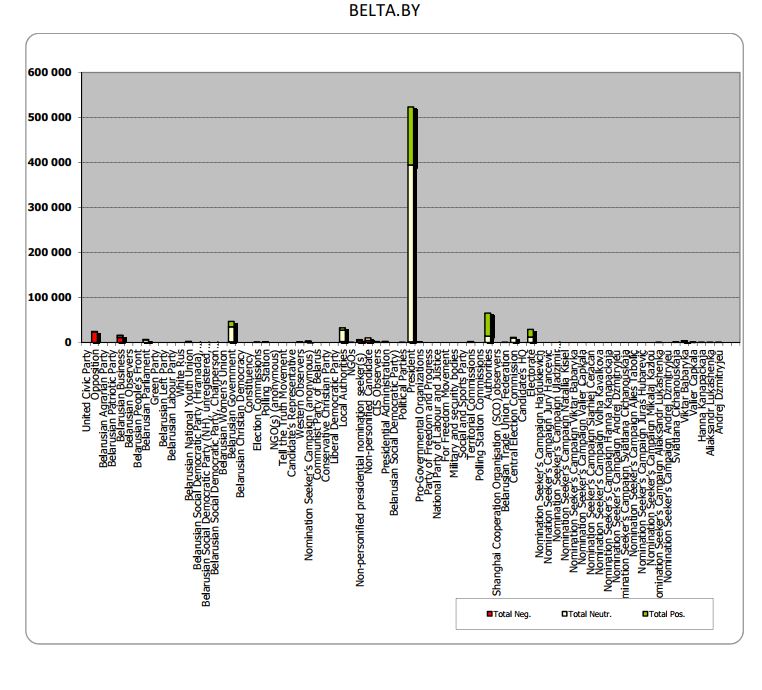
The figures below give an idea how the upcoming election is being covered in the state-run media.
The shares of airtime and space given to election coverage show that these media do not prioritise election-related issues.
The Panarama news programme on Belarus 1 allocated about 10% of its airtime to sport, nearly 7% to weather and only 4% to election coverage.
Radyjofakt on the First National Channel of the Belarusian Radio gave 6% of its airtime to election coverage, which was less than weather (7%) and sport (8%).
If we compare how much attention the upcoming election receives in the print media, the percentage of space given to the subject in the state-run SB. Belarus Segodnya was about twice as little as in the independent Narodnaja Vola.

Without focusing on the election, the state-run media turned the spotlight on the incumbent, President Lukašenka.
Nashi Novosti on ONT and Panarama on Belarus 1 allocated to him over 80% of the whole airtime given to all the election actors. The corresponding figure for Radyjofakt was 70%.
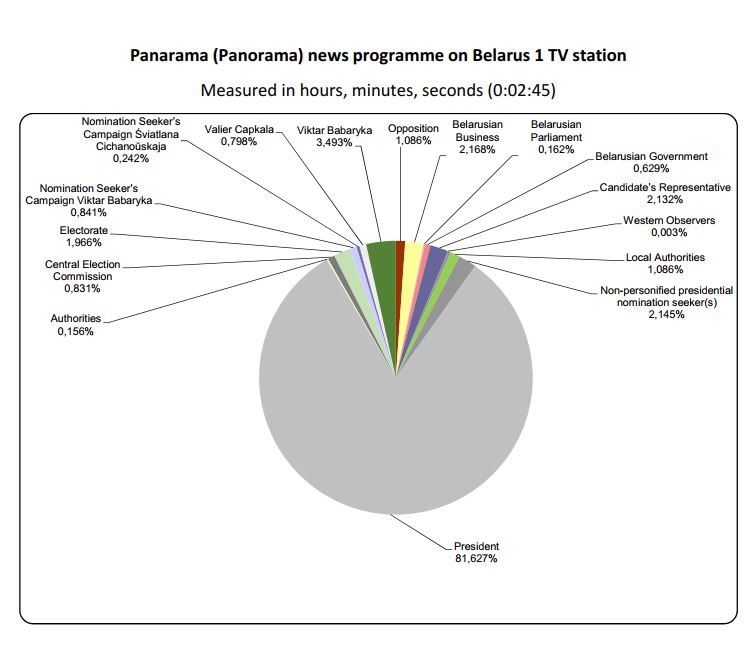
The President also had a rather strong presence in Sunday programmes, the Glavny Efir on Belarus 1 and the Kontury on ONT, getting 58% of the total coverage given to all the election actors.
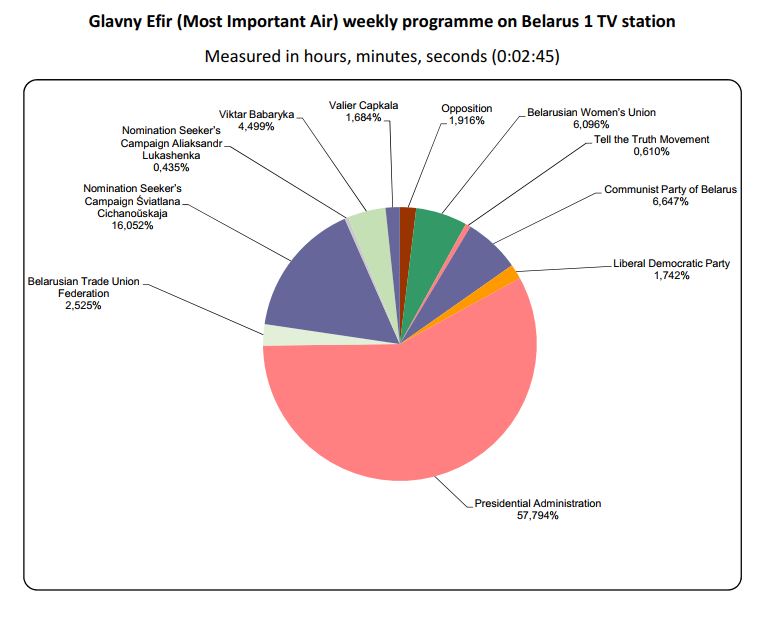
The print media granted the incumbent from 75% to 90% of the total space given to all the monitored actors. (The exact share depended on whether it is a nationwide or regional paper.)
All of these media presented the incumbent in a positive or highly positive light.
In line with a long-established tradition, the opponents of the regime have been either completely ignored or minimally present. If we take the electronic media, the above mentioned Glavny Efir and Kontury gave the most popular contender Mr Babaryka about 5% of the airtime allocated to all the election actors, and Radyjofakt allocated to him just 1% of its election-related coverage. Moreover, his personality was shown in a negative or highly negative light.
The state-run media prominently featured Belarus’ apparent achievements. The share of such content has noticeably increased since late May, for example, because of the launch of a series called We Did It in the Glavny Efir on Belarus 1 and It’s Done, a joint project of the state-run TV stations.
The reporters and the interviewees attribute the achievements to the country leader’s initiatives, decrees and demands, prompt control and care for people. Below are just a few examples.
‘Many thanks to our President Alaksandr Lukašenka, who opened these convalescent homes,’ said a patient recovering from COVID-19. (Glavny Efir, Belarus 1, 07/06/2020)
‘There are the saint’s relics here, and Alaksandr Lukašenka paid homage to them,’ said a Nashi Novosti on Saturday reporter covering the President’s visit to the convent in Polacak. ‘It was with the President’s support that the silver reliquary was restored.’ (Nashi Novosti, ONT, 13/06/2020)
‘During his customary weekly visits to the country’s regions Alaksandr Lukašenka controls the situation in the fields from the air in person,’ said a Panarama presenter. ‘Nothing can be concealed from him and no excuses will work.’ (Panarama, Belarus 1, 15/06/2020)
‘In 2006 the Head of State took a fateful decision and all recuperation centres began working in some competitive business environment,’ said Alaksiej Šapiećka, the General Manager of Pryaziorny recuperation centre. (Glavny Efir, Belarus 1, 28/06/2020)
The state-run media have demonstrated a new trend to present the opponents of the current regime as criminals.
For example, the First Deputy Minister of Internal Affairs Hienadź Kazakievič said in an interview to the Glavny Efir, ‘The heads of election commissions who held the parliamentary elections last year have been recently receiving threats. That is, the commissions for this year’s election have not yet been formed, but these people and their family members are already receiving threats.’ (Glavny Efir, Belarus 1, 31/05/2020)
Two weeks later, on 13 June 2020, Nashi Novosti on Saturday claimed that the wife of a policeman involved in detaining a coordinator of Mrs Cichanoŭskaja’s campaign had been menaced. ‘Another thing is that the spouse has been receiving threats, she is this policeman’s spouse,’ said the Minister of Internal Affairs Jury Karajeŭ. ‘Well, naturally, we will find them.’ (Nashi Novosti, ONT, 13/06/2020)
‘There are some other examples as well. Criminals, no doubt about it,’ a journalist commented on the Minister’s accusation.
It is the first time that the state-run media have said that independent media pose a threat to stability by using streams and new technologies to coordinate protests. In particular, they pinned the blame on some Telegram channels and the RFE/RL.
‘If you watch carefully these bizarre streams of campaigning for nomination turned public gatherings, which is proven by headlines in independent media, you will of course see technologies behind them,’ claimed Mr Ivan Ejsmant, the Chairperson of the Belarusian TV and Radio in the Klub Redaktorov (Editors’ Club) weekly show on Belarus 1. ‘”Why are you here?” “I’m dissatisfied.” “Who are you going to vote for?” “I am going to vote against.” “Who is going to win?” “We probably won’t win.” “So what are you going to do on 9 August?”…’
3.2 Independent media
The monitored independent media include www.naviny.by online resource and two print media, the Narodnaja Vola and the Komsomolskaya Pravda v Belorussii.
www.naviny.by has published election-related items in a special section, ranking them as a top priority.
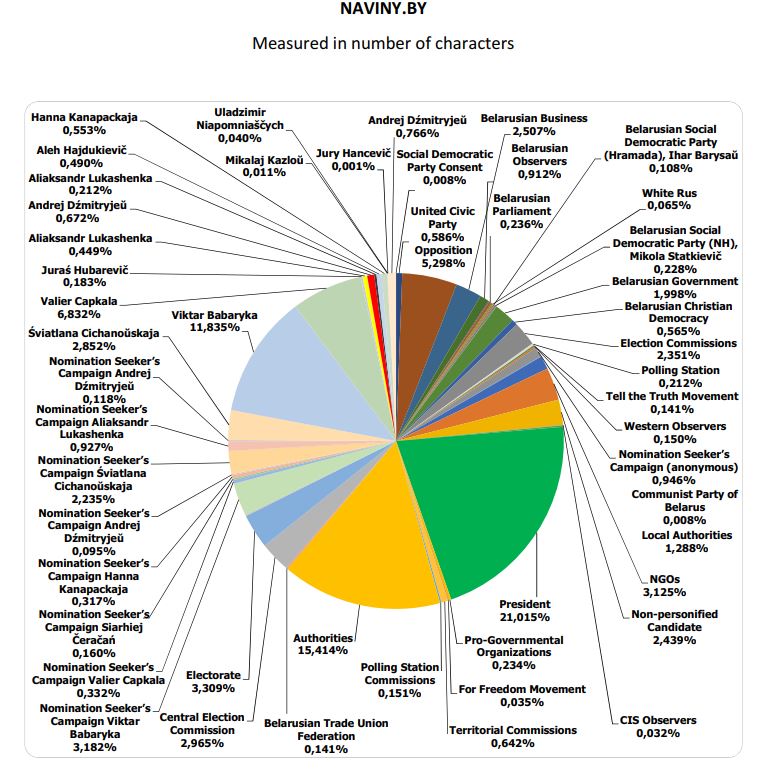
The coverage contains both information and analysis. The online resource has also held debates between some of the contenders.
The items have been balanced, which is supported by the assessments of the actors and the percentage of coverage they received. www.naviny.by has featured a wider range of actors than the state-run media. The spotlight has been on the presidential hopefuls, with quite different shares of coverage as compared to the state-run media.
The Narodnaja Vola has primarily focused its attention on the contenders. At the same time it has been critical of the incumbent, the CEC, the government, and local authorities.
Just like the Narodnaja Vola, the Komsomolskaya Pravda v Belorussii has sometimes been critical of the incumbent, the CEC, and the government. The paper presented the presidential hopefuls Mr Babaryka and Mrs Cichanoŭskaja and their activities in a positive light.
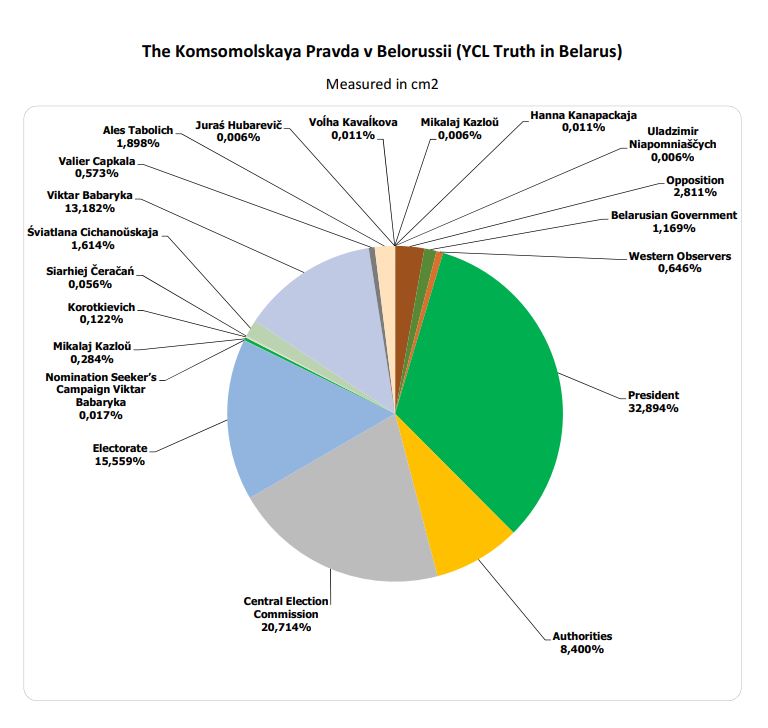
Unlike the state-run media, the monitored independent ones have avoided referring to the actors in an anonymous and depersonalised manner. They also give formal names of NGOs, movements, and political parties.
4. Media Effects
The term ‘media effects’ refers to one-sided or biased coverage, ungrounded interpretations, distortions (deliberate or not), selective or fragmentary presentation, and hushing up events or facts that could influence the public opinion or vision. The monitoring has recorded such instances.
A vivid example is the coverage of the incident in Horadnia, when the popular video blogger and head of Sviatlana Cichanoŭskaja’s campaign Siarhiej Cichanoŭski was detained during a campaign event to collect signatures for Mrs Cichanoŭskaja’s presidential nomination.
This is what the Glavny Efir presenter had to say on 31 May 2020 about the campaign activists’ arrival in the city, ‘On a quiet Friday evening in May, a small delegations in Jeeps arrived in Horadnia in order to hold a public gathering under the pretext of collecting signatures [for presidential nomination – translator’s note]. By the way, ‘activists’ is an understatement. The company looked more like a gang that bragged they were going to shoot straight, though in fact they were about to coin money.’ (Glavny Efir, Belarus 1, 31/05/2020)
Interestingly enough, this thieves’ cant was used to describe a registered nomination seeker’s campaign and absolutely legal signature collection.
The presenter blamed Mr Cichanoŭski for the incident, ‘One of the collectors, who isn’t even seeking presidential nomination, ended up in a fight in broad daylight.’ The presenter described his subjective impression, ‘There is a strong feeling that they wanted a provocation and they got it.’
‘Provocation’ is a telltale word under the circumstances. The video broadcast by the Glavny Efir clearly shows that it was a woman’s aggressive behaviour that provoked the incident, while the blogger clearly demonstrated that he had no intention of confronting her.
The show also aired some conspiracy hints, ‘After all, Cichanoŭski’s links to Russia are said to be obvious. It was there that he had made a fortune until he decided to put in the nips from Belarusians.’
On the day when the show went on air, the arrested head of Mrs Cichanoŭskaja’s campaign had not even been formally charged.
The state-run media used the same rhetoric of disclosure in their coverage of the arrest of the most popular presidential contender Mr Babaryka. For example, Panarama commented, ‘The competent authorities of Cyprus have provided detailed information about illegal schemes, sums of money and beneficiaries. It was then that the scheme orchestrator and his accomplices decided to get into politics. In other words, first the shady business busted and only then the suspects began seeking salvation in the election.’ (Panarama, Belarus 1, 18/06/2020)
The journalist goes on to claim that the individuals implicated in the case ‘state that it was Viktar Babaryka who organised one hundred percent of the illegal schemes and was their major beneficiary.’
It is evident that the quotes are nothing other than criminal charges, which violates the presumption of innocence. It is only a court of law that can find a person guilty.
Professional ethics require that journalists refrain from any public accusations regarding a defendant’s alleged actions until the court passes its verdict, i.e. until all evidence has been considered and the defence has made its case.
Interestingly enough, the quoted report is rather long. It is unlikely that it was made on the day when Mr Babaryka was arrested. At the same time, Panarama did not report that Mr Babaryka’s campaign coffers had been blocked the day before. (The Belarusian legislation provides for campaign coffers.)
***
For further details, see: Monitoring Methodology (Appendix).
The documents that form the basis for the qualitative analysis are The Code of Ethics in Journalism (adopted at the BAJ Congress in 2006); The Declaration of Principles of Professional Ethics in Journalism; Election Coverage in Media (Belarus), 2016 edition; and International standards of election coverage in media (Legal and ethical standards, recommendations to media and individual reporters).
The quantitative analysis is based on measuring the time or space given to election coverage and its key actors. The report has a number of appendices in the form of summarising charts that show the quantitative data and the way each of the actors has been presented.
The electronic media include the Panarama news programme on Belarus 1 TV station, the Nashi Novosti news on ONT, the Glavny Efir weekly programme on Belarus 1, the Kontury weekly programme on ONT; the Radyjofakt radio programme on the First National Channel of the Belarusian Radio, and Naviny-rehijon, broadcast by Mahilioŭ TV and Radio Company. The online resources include www.tut.by and www.belta.by. The print media are the SB. Belarus Segodnia, the Narodnaja Vola, the Komsomolskaya Pravda v Belorussii, the Zviazda, the Minskaja Praŭda, and the Mahiloŭskaja Praŭda.
More illustrations and methodology — in the attached files:
Bulletin
Graphs
Methodology
 @bajmedia
@bajmedia
